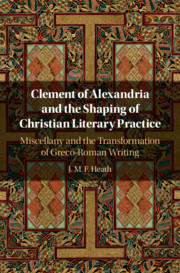 Clement of Alexandria and the Shaping of Christian Literary Practice
Clement of Alexandria and the Shaping of Christian Literary Practice Published online by Cambridge University Press: 16 December 2020
Classical scholars have often singled out the miscellany as a very open-ended genre that requires active participation from the reader, who is called to miscellanise, to select what is beneficial to his or her situation in the moment. Clement, meanwhile, has been cast either as a mere conduit of the divine logos delivering a fixed message, or as a sophist seeking to legitimise his wares in the marketplace of competing philosophies. Implicit in these portrayals of Clement’s authorial voice is a theological question of the relation between author, reader, text and God. By juxtaposition and comparison with imperial miscellanies, we see that Clement reinterpreted this relationship in light of his Christian spirituality and theology. He attributes his vocation to ‘the Saviour himself’ and portrays the reading and writing of notes as a spiritual and ascetic practice, shaped in light of eucharistic devotion and a psalmic prayer. He situates it within the life-generating tradition of the apostles and depicts his own, exemplary journey of discovery culminating in miscellany-making in chaste love, imaged as rest with the bee that anthologises the scriptural meadow in Egypt.
To save this book to your Kindle, first ensure no-reply@cambridge.org is added to your Approved Personal Document E-mail List under your Personal Document Settings on the Manage Your Content and Devices page of your Amazon account. Then enter the ‘name’ part of your Kindle email address below. Find out more about saving to your Kindle.
Note you can select to save to either the @free.kindle.com or @kindle.com variations. ‘@free.kindle.com’ emails are free but can only be saved to your device when it is connected to wi-fi. ‘@kindle.com’ emails can be delivered even when you are not connected to wi-fi, but note that service fees apply.
Find out more about the Kindle Personal Document Service.
To save content items to your account, please confirm that you agree to abide by our usage policies. If this is the first time you use this feature, you will be asked to authorise Cambridge Core to connect with your account. Find out more about saving content to Dropbox.
To save content items to your account, please confirm that you agree to abide by our usage policies. If this is the first time you use this feature, you will be asked to authorise Cambridge Core to connect with your account. Find out more about saving content to Google Drive.